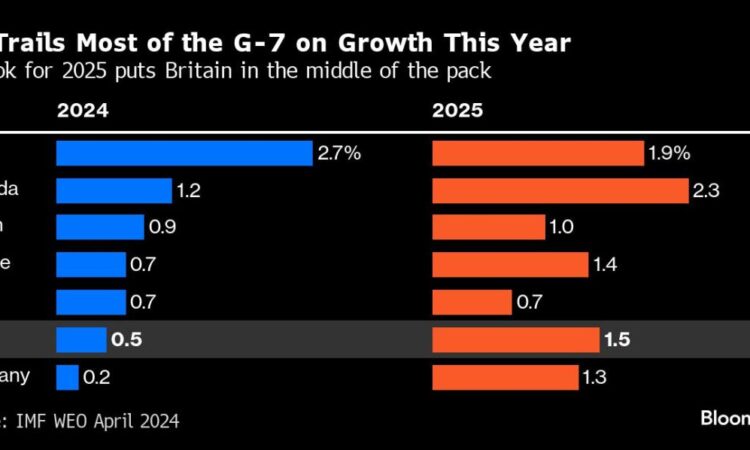
(Bloomberg) — Bank of England Governor Andrew Bailey said the UK and the rest of Europe are facing less of an inflation threat than the US, opening the prospect of a rate cut for Britain before the Federal Reserve moves.
Most Read from Bloomberg
Inflation in the UK will fall near its 2% target next month and has declined roughly in step with the BOE’s forecast in February, Bailey said Wednesday at a meeting of the Institute of International Finance in Washington.
“I expect that next month number will show quite a strong drop because we have a particularly unique energy to household energy pricing system in the UK,” Bailey said.
The comments marked a relatively sanguine reading of the UK’s inflation rate, which earlier in the day came in at 3.2% in March, a notch above the 3.1% reading the BOE had expected. Investors pared back expectations for rate cuts after that report, reacting also to an upside surprise in the US.
Bailey argued that the threat the UK faces is not as severe as the US and aligned himself with Christine Lagarde, president of the European Central Bank, who has indicated rates my be cut soon.
“I think Christine Lagarde said this last week, European inflation dynamics are somewhat different from US inflation dynamics,” Bailey said. “There is more demand led inflation in the US, while we’re seeing the unwind of supply shocks still going on. I think in Europe inflation dynamics look somewhat different.”
Those words marked a sharp contrast with US Federal Reserve Chair Jay Powell, who this week signaled that US rates may need to remain higher for longer because inflation is taking longer than expected to return to target.
The dollar has rallied on the prospect, and sterling edged down after Bailey made his comments.
However, Bailey cautioned that the BOE will remain wary about inflation because of “unbalanced” readings in sub-components of the indicator. He noted that services inflation still about 6% but energy price inflation is running at minus 20%.
He also agreed with the International Monetary Fund’s analysis that suggested that demand is overheating in the US but is below potential in the UK and the eurozone. That would suggest the Fed may need to raise rates and the UK and eurozone cut them.
Bailey was careful not to suggest the UK inflation risk is over. Inflation has fallen to 3.2% from 11.1% in late 2022 but the sharp fall anticipated next month is a result of lower energy prices. Meanwhile, underlying prices pressures remain high.
“That’s an unbalanced picture,” he said. “We don’t have to have every component actually at target, but you do have to have a better balance. So obviously, it’s the second part that we’re looking at. It is coming down, but it’s coming down gradually.”
Wage growth remains elevated, but Bailey said he expects it to drop as headline inflation recedes. He added that there was evidence that the labor market is “loosening.” “We are effectively disinflating at full employment,” he said.
Risks remain from the conflict in the Middle East, but the oil price hasn’t leaped as much as feared and the economic consequences have been limited.
Most Read from Bloomberg Businessweek
©2024 Bloomberg L.P.






